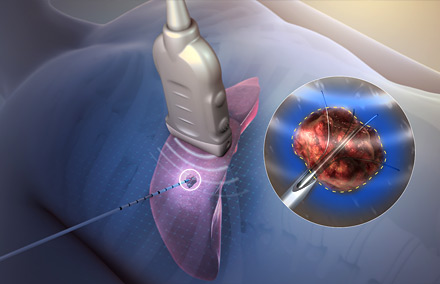Percutaneous radiofrequency ablation, a minimally invasive interventional therapy for local tumor, has proved to be an effective and safe remedy for malignant solid tumors by virtue of its fewer complications and accurate positioning. It is one of the characteristic techniques carried out in Minimally Invasive Intervention Department of Guangzhou Royallee Cancer Center.

The way percutaneous radiofrequency ablation works is high temperature. The lesion generates heat energy under the action of alternating electric field formed by radiofrequency, which raises the temperature of the tissue and causes coagulative necrosis. The ablation delivers a maximum blow to the tumor tissue and minimizes damage to the surrounding normal tissues.
1. Precise blow and tiny trauma: It is featured with accurate positioning, precise blow to tumor lesions and minimal damage to surrounding normal tissues. Minimally invasive treatment does less harm to patients than open surgery because the trauma is tiny.
2. Recognized efficacy and powerful tumor elimination: The patient will witness the gradual apoptosis, necrosis, absorption and disappearance of tumor cells following the treatment. The ablation also helps reduce the size of some giant tumors and inoperable tumors to achieve the regression for chance of cure.
3. Smaller side effects and repeatability: Unlike conventional radiotherapy and chemotherapy, percutaneous radiofrequency ablation delivers a precise blow to tumor lesions without damage to surrounding normal tissues. Thus there is zero toxic side effects and low recurrence rate. And it is an operation of high repeatability.
4. Safety, reliability and affordability: It is applicable to a wide range of tumor population, e.g., old and frail people with basic diseases that can’t withstand systemic anesthesia in conventional surgery. And the charge is relatively low and affordable.
The technique can be applied to liver cancer, lung cancer and breast cancer. Patients with primary tumors, metastatic tumors, advanced tumors that cannot be removed surgically and tumors that cannot be completely removed during surgery should come for radiofrequency ablation treatment, especially for those who can barely withstand radiotherapy and chemotherapy. Radiofrequency ablation is now clinically applied to various types of substantial tumors as well as cardiac muscle tissue with arrhythmia, hyperplastic prostate and benign gynecological hyperplastic diseases by virtue of less trauma, shorter operation time, less chance of infection and quicker healing. The advancement of the technique has offered another option to some patients who are not fit for surgery or unwilling to suffer since it preserves organs and functions to the fullest extent.
Please do not hesitate to contact us if you want to find out whether this treatment goes well for you. We are here to provide customized treatment plan through multidisciplinary consultation.

